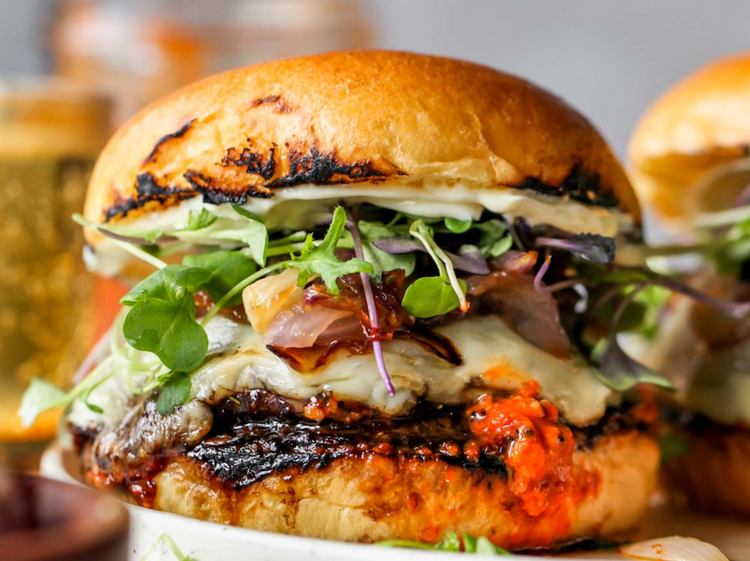How (and why) I became Vegan and why you might want to try it too

In recent years, veganism has surged as more people adopt a plant-based lifestyle for ethical, environmental, and health reasons. With the rise of chronic illnesses such as heart disease, diabetes, and obesity, many are turning to veganism to promote a healthy lifestyle.
In this article, I will take you on a journey through my two-year vegan lifestyle experience. From the challenges I faced to the benefits I gained, I'll share everything I've learned about how veganism can positively impact your health and overall lifestyle.
How and Why I became vegan
As a teenager, I struggled with a series of digestive issues that left me constantly feeling bloated, tired, and foggy-headed. Despite visiting several doctors, I was repeatedly told nothing was wrong with me. But deep down, I knew something was off. I didn't want to settle for feeling "normal" - I wanted to feel truly healthy and vibrant. This led me to discover the benefits of a healthy lifestyle, the importance of nutrition, and food intolerances.
After years of struggling, I finally decided to take matters into my own hands and try a different approach. I started by eliminating dairy from my diet and then gradually removed other animal products as well. The results were astounding - within just a few days of being fully vegan, my symptoms vanished, and I felt like a new person.
At first, I was skeptical that such a simple change could make such a big difference, but I soon discovered that there was much more to veganism than I had realized. Not only did it help me feel better physically, but it opened up a whole new world of delicious and nutritious foods that I would never have tried otherwise. And as I delved deeper into the vegan lifestyle, I learned about its numerous benefits for my health, the environment, and animal welfare.
After more than two years of being vegan, I can confidently say that it was the best decision I ever made. I feel healthier, happier, and more connected to the world. And while I understand that going vegan isn't for everyone, I believe that everyone could at least give it a try - you never know how much it might change your life until you take that first step.
The first year on a vegan diet was so exciting.
The first year on a vegan diet can be an exciting but also challenging time. It's a period of exploration and discovery as you learn about new plant-based foods and find creative ways to prepare them. At the same time, it can also be a time of adjustment as you navigate social situations and deal with the occasional cravings for your old favorite foods. But with the right mindset and support, the first year can also be a transformative experience, leading to improved health and increased energy!
The first year as a vegan can bring about significant changes in your life, and it's essential to prepare for these changes properly. It's not just about changing what you eat; it's about changing your mindset and lifestyle. You may need to adjust your social circle, find new restaurants, and learn to read food labels carefully. It's essential to approach this transition with an open mind, a willingness to learn, and a positive attitude. With the proper support and resources, the first year can be a time of growth and discovery, leading to a healthier, more compassionate, and fulfilling life.
Plant-based doesn't necessarily mean vegan.
The vegan lifestyle comes with its unique dictionary of terms that are important to understand. Some of the most essential words in the vegan dictionary include:
"vegetarian" is a term used to describe a person who follows a plant-based diet that excludes meat, poultry, and seafood. However, vegetarians still consume dairy products and eggs;
"pescetarian" is a term used to describe a person who follows a diet that excludes meat and poultry but still includes seafood. Pescetarians may or may not consume dairy and eggs but do not eat other animal flesh;
"veganism" refers to a lifestyle that seeks to exclude all animal products;
"plant-based" which means foods that are derived from plants;
"cruelty-free" refers to products that were not tested on animals;
"speciesism" which is the belief that humans are superior to other animals;
"factory farming" which refers to large-scale farming operations that prioritize profit over animal welfare; and
"veganic" is a term used to describe a type of agriculture that doesn't use animal products or byproducts.
Understanding these and other important terms can help you navigate the vegan lifestyle more easily and confidently.
The second year of being vegan is crucial.
As you approach your first year on a vegan diet, it's important to stay mindful of your vitamin B12 levels. This nutrient is crucial for healthy blood and nerve cells, but can only be found in animal products. Signs of B12 deficiency include feeling breathless, exhausted, and experiencing tingling sensations in your hands and feet, as well as poor memory.
Thankfully, preventing B12 deficiency is easy. By consuming three servings of fortified foods each day or taking a supplement, you can keep your levels in check. It's important to manage this deficiency, as it can negate the benefits of a vegan diet for reducing heart disease and stroke risk, and even cause permanent nerve and brain damage.
Additionally, it's important to think long-term when it comes to our bones. Our skeletons act as mineral stores, but after the age of 30, our bones can no longer absorb minerals. That's why it's crucial to ensure you're getting enough calcium when you're young, as it can affect your bone health later in life.
After the age of 30, our bodies harvest the calcium from our skeleton for use in the body, and if we don’t replenish the calcium in our blood through our diet, our bones fill the deficit and become brittle as a result. This is a particular concern for those following a vegan diet, as animal products are the most efficient source of calcium.
While vegetables like kale and broccoli are rich in calcium and can help protect bones, many vegans don’t meet their calcium requirements. In fact, research has shown that there is a 30% increased risk of fracture among vegans when compared to vegetarians and omnivores. Plant-based calcium is also harder to absorb than calcium from animal sources, so it is recommended that vegans take supplements or consume plenty of fortified foods to ensure they meet their daily calcium requirements. Taking care of our bones is important, and especially so for vegans who need to be mindful of their calcium intake to maintain healthy bones.
Do I need to eat tofu as a vegan?
Tofu is a popular source of protein in vegan and vegetarian diets. It is made from soybeans and has a neutral taste, making it a versatile ingredient used in various dishes. However, despite its nutritional benefits, some people avoid tofu because they do not like its texture or taste. It is important to note that different types of tofu, such as firm and silken, and various ways to prepare it, such as grilling, baking, or stir-frying, can change its texture and flavor. With some experimentation, tofu can be a tasty and healthy addition to a plant-based diet.
But, no, you do not need to eat tofu as a vegan. While tofu is a popular source of plant-based protein for many vegans, plenty of other protein-rich foods are available. Lentils, chickpeas, beans, quinoa, and nuts are just a few examples of plant-based protein sources that can be incorporated into a vegan diet. That being said, tofu can be a convenient and versatile ingredient in many dishes and is often used as a meat substitute due to its high protein content and texture. Whether or not you choose to eat tofu is a personal preference and should be based on your individual dietary needs and taste preferences.
Other Vegan Proteins
As a vegan, there are many protein options beyond tofu that you can incorporate into your diet. Legumes such as lentils, chickpeas, and beans are excellent protein sources and can be used in various dishes such as soups, salads, and stews. Nuts and seeds are also excellent protein sources, such as almonds, cashews, chia seeds, and hemp seeds. You can also incorporate whole grains like quinoa and brown rice, which contain higher protein content than other grains. Additionally, plant-based protein powders made from sources like peas, brown rice, and hemp can be used in smoothies or baked goods. It's essential to remember that a balanced and varied diet is crucial in meeting your protein needs as a vegan.
How much protein do I need?
The amount of protein you need depends on your age, gender, weight, and activity level. Generally, it is recommended that adults consume 0.36 grams of protein per pound of body weight per day (0.8 g/kg).
150 lbs x 0.36 g/lb = 54 grams of protein per day
The Acceptable Macronutrient Distribution Range (AMDR) for adult protein is 10-35% of the total daily calorie intake. To calculate the specific amount of protein needed, it's recommended to consult with a registered dietitian or use a macronutrient calculator that takes into account individual factors.

You can easily meet your protein needs as a vegan by incorporating various foods into your diet. However, you may need more protein if you are an athlete or engage in heavy physical activity. As a vegan, it's essential to be mindful of protein intake and ensure you get enough through various plant-based sources such as beans, lentils, tofu, tempeh, nuts, seeds, and whole grains.
To give you an idea of what 54 grams of protein on a vegan diet look like, here are a few examples:
- Breakfast: Overnight oats (1/2 cup) with 1 tbsp chia seeds, 1 cup of almond milk, and 1 tbsp sliced almonds (11 grams of protein)
- Mid-morning snack: Apple slices with 2 tbsp almond butter (4 grams of protein)
- Lunch: 1 cup of cooked Quinoa and 1 cup of cooked black bean salad with 1 cup of mixed vegetables and 1/2 avocado (20 grams of protein)
- Afternoon snack: 1/4 cup (or 35 grams) Roasted chickpeas (6 grams of protein)
- Dinner: 3-ounce Grilled tempeh with 1 cup of sautéed vegetables and 1 cup of brown rice (13 grams of protein)
This adds up to a total of 54 grams of protein for the day. Of course, everyone's protein needs and dietary preferences are different, so it's crucial to find a balance that works best for you.

It's important to note that this is just a general guideline, and individual protein needs may vary based on factors such as activity level, age, and overall health. It's always a good idea to consult with a healthcare professional or registered dietitian to determine the best protein intake for your individual needs.
Vegan Supplements
Obtaining all the necessary nutrients solely through food sources can be challenging as a vegan. Therefore, supplements are an essential part of a vegan diet. Vegans can ensure they meet their nutritional needs and maintain optimal health by taking supplements. Some nutrients that may be more difficult to obtain in adequate amounts on a vegan diet include vitamin B12, vitamin D, iron, calcium, and omega-3 fatty acids.
Vegans need to supplement certain nutrients because these nutrients are mainly found in animal products. Vitamin B12 is essential for proper brain function and nerve health and is found primarily in animal products, so vegans must supplement it. Vitamin D is necessary for strong bones, and while sunlight is a natural source of vitamin D, many vegans may not receive enough sunlight exposure. Iron is essential for producing healthy red blood cells and is often found in meat, so vegans may not get enough iron through their diet. Calcium is critical for strong bones and teeth, and while many plant-based foods are high in calcium, vegans may still need to supplement to meet their daily requirements. Lastly, omega-3 fatty acids are essential for brain function and cardiovascular health. They are primarily found in fish, so vegans may need to supplement with algae-based supplements to ensure they are meeting their daily requirements.
It is essential to consult with a healthcare professional or registered dietitian before starting any supplements to determine individual needs and ensure safety.
Everything I didn't know before I went vegan.
- Not getting enough nutrition, vitamins, and minerals can lead to problems with sleep, focus, and energy. You'll need those supplements.
- Our body stores nutrition, vitamins, and minerals for about a year so you won't feel deficits immediately.
- Many vegan products don't need a vegan label, like pasta, margarine, marinara sauce, or cookie dough, but you need to read the labels to be sure.
- Protein powders can be clean and are really helpful in getting enough proteins on a vegan diet.
- You'll improve your cooking skills fast.
- Walnuts are excellent meat replacements.
- You can easily turn every recipe into a vegan recipe.
- It'll be hard to find a restaurant (that is not vegan) that will serve vegan dishes that are actually filling you at dinner. But you can create your meal by stocking up on side dishes.
- You'll learn how to talk with strangers :) Because there will be a lot of social situations when you'll have to explain yourself or simply get what you want in the way you want it :)
Should I go vegan?
Deciding to go vegan is a personal choice that depends on many factors, such as your health, ethics, environmental concerns, and lifestyle. While a vegan diet can offer many health benefits and reduce your carbon footprint, it's not the best choice for everyone. Some people may have medical conditions that require specific nutrients that are difficult to obtain from a vegan diet, while others may struggle with the social aspects of being vegan. However, many people who have adopted a vegan diet report feeling better physically and mentally and experiencing a sense of fulfillment knowing they are positively impacting the world. Ultimately, it's up to you to weigh the pros and cons and decide if a vegan lifestyle aligns with your values and goals.




Comments ()